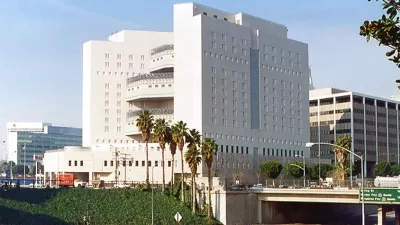Davis’ unflinching portrait of Los Angeles politics and power dynamics remains a penetrating analysis of modern city-building, who it benefits, and who it leaves behind.

Few people captured the conflicting feelings of love and frustration that Los Angeles elicits in those who experience the city more than author and cultural critic Mike Davis, who died this Tuesday. In an obituary for the Los Angeles Times, Carolina A. Miranda describes Davis’ legacy as an incisive critic and staunch defender of the complicated metropolis, whose book City of Quartz remains a seminal work in urbanism and history.
In the book, Davis laid bare the inequity and power dynamics that shape the city, exposing the dark underbelly of the City of Angels. “Released by the lefty publishing house Verso, it was 462 dense, unsparing pages about the ways in which powerful interests in Los Angeles — namely, real estate developers, aided and abetted by politicians and the Police Department — had ruthlessly molded the landscape of the city to their whim, principally at the expense of the working class and people of color, all while promoting myths about backyard living.”
But Davis was also an ardent booster for Los Angeles. City of Quartz was, for Davis, a cautionary tale rather than an indictment. Miranda ends with a quote that sums up Davis’ feelings about his work. “I love Los Angeles. How can you not see that? I suppose the book is, in the end, a failure if it betrays none of the sense of deep feeling I have about the city. But that’s where being a radical comes in — you have to rain on the parade.”
FULL STORY: Mike Davis, ‘City of Quartz’ author who chronicled the forces that shaped L.A., dies

Alabama: Trump Terminates Settlements for Black Communities Harmed By Raw Sewage
Trump deemed the landmark civil rights agreement “illegal DEI and environmental justice policy.”

Planetizen Federal Action Tracker
A weekly monitor of how Trump’s orders and actions are impacting planners and planning in America.

Why Should We Subsidize Public Transportation?
Many public transit agencies face financial stress due to rising costs, declining fare revenue, and declining subsidies. Transit advocates must provide a strong business case for increasing public transit funding.

Understanding Road Diets
An explainer from Momentum highlights the advantages of reducing vehicle lanes in favor of more bike, transit, and pedestrian infrastructure.

New California Law Regulates Warehouse Pollution
A new law tightens building and emissions regulations for large distribution warehouses to mitigate air pollution and traffic in surrounding communities.

Phoenix Announces Opening Date for Light Rail Extension
The South Central extension will connect South Phoenix to downtown and other major hubs starting on June 7.
Urban Design for Planners 1: Software Tools
This six-course series explores essential urban design concepts using open source software and equips planners with the tools they need to participate fully in the urban design process.
Planning for Universal Design
Learn the tools for implementing Universal Design in planning regulations.
Caltrans
Smith Gee Studio
Institute for Housing and Urban Development Studies (IHS)
City of Grandview
Harvard GSD Executive Education
Toledo-Lucas County Plan Commissions
Salt Lake City
NYU Wagner Graduate School of Public Service



























